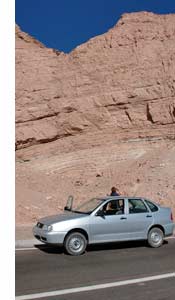ADVENTURE TRAVEL in Chile
How to travel?

![]()
Around 25 foreign airlines arrive in the international airport of Santiago, Comodoro Arturo Merino Benítez, situated 20 kilometers to the West of the city. Some international airlines also fly to the airports of Arica (Chacalluta), Antofagasta (Cerro Moreno), Iquique (Cavancha), Temuco (Maquehue), Puerto Montt (Tepual) and Punta Arenas (Presidente Ibáñez). Besides offering various amenities and services, all these venues contain international police, migration and Customs. In turn, there are several private companies that provide shuttles to town and to the hotels.
Taxis, minibuses and regular buses take passengers to the airport of Santiago (approximate rate: u$s 6).
LanChile is the main airline in the country. It has regular daily flights to Santiago from the cities of New York, Miami and Los Ángeles (United States). In Europe, the daily service leaves from Frankfurt and Madrid and, as a result of an alliance with Iberia, there is a connection with various cities in the rest of the continent.
Likewise, there are daily flights from other points in America, such as the cities of México, Bogotá, Lima, La Paz, Buenos Aires, Mendoza, Córdoba, Río de Janeiro, Sao Paulo and Montevideo. In the South Pacific, there are flights from Tahiti and French Polynesia.
Travelers must pay an airport tax of USD 18 or its equivalent in national currency at all international airports.
Citizens from countries like the United States, who charge Chilean citizens for visa proceedings, must pay a reciprocity tax of USD 100 in cash as they enter the country.
Several routes crossing the main road network reach the neighboring countries (Argentina, Peru and Bolivia). Even though they are in excellent conditions and properly signaled, most of the international passes accessed by these roads are located inside the mountain range; therefore, it is convenient to find out if they are open and accessible during the winter season.
As it has such a long border, there are several mountain passes open for travelers. There are 48 passes into Argentina (40 of them are permanent and 8 are temporary). The most popular are Los Libertadores, in the central area, and Cardenal Samoré, in the South (Province of Osorno). There are 7 passes permanently open along the Bolivian border, and only one towards Peru: Concordia (Chacalluta), in the Province of Arica.
Check: www.carabineros.cl
The vast Western coast of the Chilean territory has fostered sea communication. This encouraged the building of significant ports mainly for commercial and tourist exchange. The most outstanding ports include Antofagasta, Valparaíso, Santo Domingo, Concepción, Puerto Montt and Punta Arenas. From December to March, several transatlantic cruises pass through these ports carrying thousands of tourists towards Patagonia or Easter Island.
![]()
Three airlines offer flights around the country. LanChile covers the entire country, Sky Airlines flies north and Aerolíneas del Sur has destinations like Iquique, Antofagasta, Calama, Puerto Montt and Punta Arenas, as well as Santiago.
This is a convenient and inexpensive way of traveling inside the country. The big passenger transportation companies join the most relevant destinations, whereas the smaller and regional companies connect small districts.
To travel around the City of Santiago there is an important comfortable metro network with three bus lines.
The State-owned Railway System only operates from the capital city towards the Southern part of the country, ending at Temuco and passing through Rancagua, Talca, Chillán and Concepción. Passengers may also travel by Metro Tren, a fast service joining Santiago and the VI Region, which stops at most districts located between these two destinations.
In general, the railway service is comfortable and accessible. Transportation of automobiles is only possible on the AutoTren that goes from Santiago to Temuco and vice versa.
To see rates, itineraries and timetables, please check: www.efe.cl
There are several shipping companies offering services from Puerto Montt to the Chiloé area, including Chaitén and Quellón. Also from this city, Port Chacabuco may be visited to see the glaciers of beautiful San Rafael Lagoon or sail up to Puerto Natales, crossing national parks and forest reserves that treasure incredible natural beauties.

![]()
The Panamericana Road is the main road, stretching from Arica, up North, to Puerto Montt, in the South, and crossing the most important cities in the territory. It is a fast and safe communication way featuring restaurants and gas stations at the main accesses.
The Carretera Austral (Southern Road), with some stretches still under construction, goes from Puerto Montt to Punta Arenas. At present, due to the topographical conditions, part of this road crosses into Argentinian territories, but when it is finished, the road will run along 1,200 kilometers passing by Patagonian sceneries of singular beauty.
It is important to point out that traffic travels on the right-hand side of the road in Chile and the use of seat belts is compulsory. Maximum speed allowed in highways is 120 km/h and on the other roads, 80 km/h. In turn, traffic is mainly controlled by the carabineros and the civil police with radars and photographic cameras.
There are both local and international car rental companies across all Chile. They offer several categories and various car models. Beyond some specifications typical from each rental, in order to rent a car in Chile, the following aspects are to be considered:
- being over 25 and under 75 years old.
- having a valid driving license issued at the visitors’ native country.
- presenting a credit card or check as a guaranty when carrying out the operation.
- presenting a valid ID or passport.
In addition to offering the traditional services, these companies may provide optional services such as drivers -some of them bilingual-, and a permit or liability insurance to travel to Argentina.
© 2007-2025 Total or partial reproduction forbidden. Derechos de Autor 675243 Ley 11723
Who we are | Contact us | Press and Publicity | Terms and Conditions




